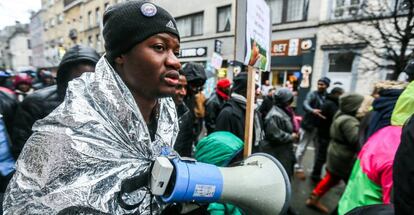Belgian minister who offered asylum to Puigdemont expels Sudanese migrants
Calls for Theo Francken to resign after deportees reportedly tortured upon return to their country

The Belgian government is teetering on the brink after Immigration Minister Theo Francken authorized the deportation of a dozen Sudanese citizens who reported being tortured upon their return to the African country.
Francken’s tough stance towards the Sudanese asylum seekers is in stark contrast with his complacent attitude towards Puigdemont
Francken, a hardliner within his Flemish nationalist party N-VA, made this decision as he was almost simultaneously offering political asylum to Carles Puigdemont, the ousted premier of Catalonia. A day after this statement, Puigdemont fled to Brussels to avoid action by the Spanish justice system, which is investigating him for sedition and rebellion in connection with his illegal independence drive.
Puigdemont – who is a citizen of Spain and may freely reside anywhere in the EU – ultimately did not apply for asylum, but he has been in Brussels since late October.
The Belgian federal executive is a delicate balancing act of four political forces, with the N-VA carrying the most weight even though Prime Minister Charles Michel is a French-speaking liberal.
Francken’s tough stance towards the Sudanese asylum seekers is in stark contrast with his complacent attitude towards Puigdemont, a fellow nationalist like himself.
While Francken expressed doubts that Puigdemont would get a fair trial back in Spain, he did not hesitate to encourage repatriations to Sudan – a country whose president, Omar al-Bashir, has been accused of war crimes by the International Criminal Court.
The political storm in Beglium has yet to pass, and a growing chorus of voices is asking for Francken to resign
In September, the migration minister welcomed a political delegation from Khartoum whose members came to identify Sudanese migrants being held in detention centers. Several organizations, including the Tahrir Institute for Middle East Policy, later documented abuse against the deportees back home.
These delegate missions have become a common practice in European countries trying to encourage the return of migrants without asylum rights, but deportation decisions must respect some basic principles. Foreigners have the right to request protection, and the returning state must ensure that the deportee will not be subjected to degrading treatment back home.
According to the courts, Belgium has failed on this last criterion. A decision by the Appeals Court in Brussels says that the manner in which one of the Sudanese migrants under threat of deportation was held “does not conform to legal requirements,” especially in light of “information about the particularly alarming situation in Sudan,” reads the January 4 decision, which EL PAÍS has seen.
According to the courts, Belgium has failed to ensure that deportees will not be subjected to degrading treatment back home
“The Belgian state has not respected Article 3 of the European Convention on Human Rights, which prohibits torture or inhumane or degrading treatment,” said Luc Denys, a lawyer specializing on these issues.
For the moment, Belgian authorities have halted further deportations and an investigation is underway. But the political storm has yet to pass, and a growing chorus of voices is asking for Francken to resign. Party leader Bart de Wever has issued a threat: “If a majority asks for Francken’s resignation, the N-VA will abandon the government.” Meanwhile, another governing partner, the Flemish conservative CD&V, has accused the prime minister of turning into “the N-VA’s puppet” for allowing the existence of such migration policies.
Aware of the risk of dissolution that would affect the ruling coalition if the N-VA, the most-voted party in Belgium, walks out, Charles Michel is trying to cushion the blow. The liberal leader said on Monday that he does not feel “intimidated by the blackmail, the threats and the provocations” and underscored that the investigation does not directly question Francken’s decisions.
But the migration official’s actions have managed to create discord within the Belgian government once again, after the tension of recent months over his – and his party’s – position on the Catalan conflict.
English version by Susana Urra.
EU promotes return operations
Belgium is not the only country that “invites” authorities from the territories that migrants come from to cooperate in their deportation. France has also welcomed missions from Sudan aimed at incentivizing the return of citizens to the African country. With a return rate of less than 40% of migrants through the use of forced deportation, the European Union is committed to ramping up this policy in a bid to focus on attending to and integrating refugees at the cost of blocking the route for so-called economic migrants. But the line between the two groups is, despite everything, more than a little blurred.
To make this return work more efficient, the EU border protection agency Frontex has added his take to its list of functions. At the beginning of 2017, the European Commission informed Frontex experts that “Identification missions from key third countries should be further organized where participating authorities issue travel documents during or immediately after such missions.” One of the greatest challenges in deportations lies in getting transit states or countries of origin to accept the return of migrants from the EU states where they have arrived .The return missions aim to streamline this process with opaque agreements.
While Frontex offers support, the final responsibility for these operations rests with EU member states. Any return can only be carried out after the migrant has been given the opportunity to plead asylum and on the condition that the return to the state of origin does not involve a risk for that migrant. These two conditions are not always met.
English version by George Mills.
Tu suscripción se está usando en otro dispositivo
¿Quieres añadir otro usuario a tu suscripción?
Si continúas leyendo en este dispositivo, no se podrá leer en el otro.
FlechaTu suscripción se está usando en otro dispositivo y solo puedes acceder a EL PAÍS desde un dispositivo a la vez.
Si quieres compartir tu cuenta, cambia tu suscripción a la modalidad Premium, así podrás añadir otro usuario. Cada uno accederá con su propia cuenta de email, lo que os permitirá personalizar vuestra experiencia en EL PAÍS.
¿Tienes una suscripción de empresa? Accede aquí para contratar más cuentas.
En el caso de no saber quién está usando tu cuenta, te recomendamos cambiar tu contraseña aquí.
Si decides continuar compartiendo tu cuenta, este mensaje se mostrará en tu dispositivo y en el de la otra persona que está usando tu cuenta de forma indefinida, afectando a tu experiencia de lectura. Puedes consultar aquí los términos y condiciones de la suscripción digital.









































